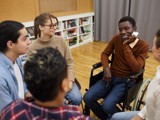Lived Experience
Human rights are the legal rulebook that governs the relationship between people and public power. At BIHR, we bring together our expertise in the law, beyond the courts, as a practical tool that can improve people’s lives and the services they rely on.
BIHR’s work has always been informed by what the Human Rights Act means for people in their everyday lives. Both making this change happen and sharing this evidence of change through the use of the law is what makes BIHR unique.
For us, lived experience expertise is about people’s direct involvement of the everyday issues that impact them, and the extent to which human rights are being upheld (or not). Our 2020-25 Strategic Framework has been the springboard for us to further develop how we bring lived experience into BIHR’s work.
Our work
How we bring lived experience expertise into our work
We take our lived experience work seriously and dedicate time and resource to this work. We do not view people as “case studies”. We view people as people, people who have important everyday expertise that can be powerfully combined with our legal and practical knowledge. Together, we have an important story to share about the everyday value of our Human Rights Act.
We also have a range of lived experience across our team. In 2021, our Trustee Board prioritised lived experience expertise with the appointment of Joe Powell.

A note about our Easy Read work
We have built up expertise in producing Easy Read materials. We usually co-produce our materials directly with people with learning disabilities or people with learning disabilities proof our Easy Read resources. Groups we work with include:
- Pembrokeshire People First
- Kirklees Involvement Network
- Warrington Speak Up
- Scottish Commission for People with Learning Disabilities
Co-Production
What is co-production?
Co-production is when service-providers work alongside people accessing or trying to access services to ensure the service best meets everyone's needs. This way of working can create immediate change, by changing a particular service according to feedback from the people who are trying to access it, as well as more systemic change, by demonstrating that service provision should be collaborative and people accessing services should have a say in any decisions made about them.
How does co-production work at BIHR?
At BIHR, we work with Lived Experience Expert Consultants to develop and deliver training for public sector staff. Our Human Rights in Children's Inpatient Mental Health Services project focuses on building NHS staff knowledge and capacity to proactively uphold human rights as well as empowering young people and their loved ones by helping them understand their rights and how to raise concerns.
What are the benefits of co-production?
Through our work, we've seen the benefits of co-production for staff and workshop participants; for people accessing services; for trainers; and in wider research.
Stay up-to-date
Get our newsletter
Get monthly updates on UK human rights law and our work, resources and events sent straight to your inbox.



